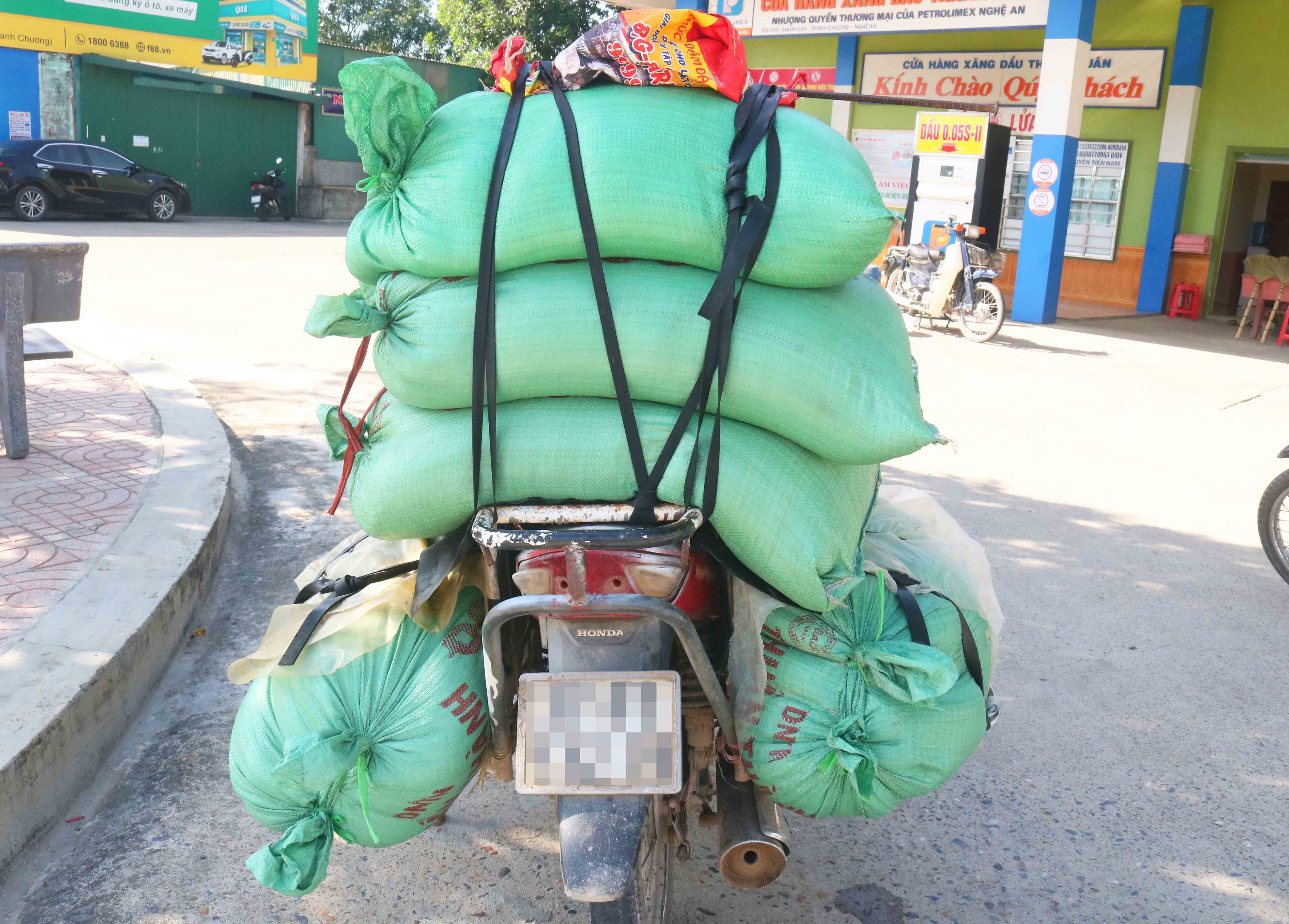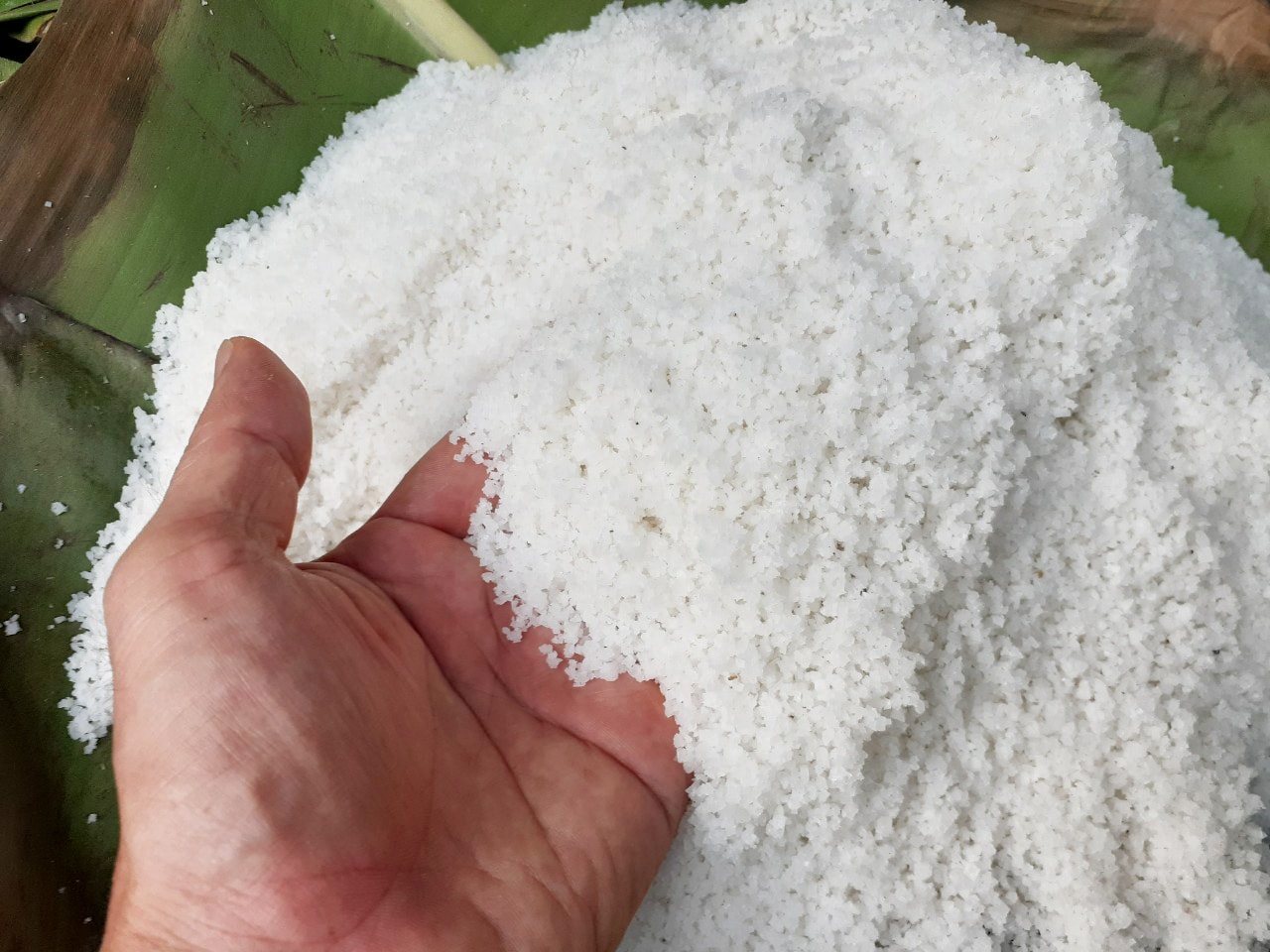The hard work of selling salt on the street
(Baonghean.vn) - Going out when it is dark, returning when it is dark, the job of selling salt on the street has always been the same. The money earned from the job "Who wants salt for free" is soaked in sweat, the salty taste of the sea, the hardship, and sometimes even tears.
After having a quick breakfast at a cheap restaurant in My Thanh commune (Yen Thanh), salt sellers in Dien Van commune (Dien Chau) quickly got in their cars and headed up National Highway 7 to Do Luong, Thanh Chuong, Anh Son districts...
With 5 bags of salt weighing nearly 2.5 quintals, the old motorbike of Mr. Phan Van Nghi (48 years old) seemed to be overloaded. From Hoa Son commune (Do Luong), he followed National Highway 7B to Thanh Chuong.

According to Mr. Nghi, his family used to be in the salt production and salt selling business. Making salt but only selling it to traders did not bring much profit, so the salt farmers in his hometown had to bring salt to districts far from the sea to sell.
In the past, both he and his wife sold salt, but later because she was busy taking care of their children, she quit, but he still continues to do the job until now. Up to now, he has been in the profession for more than 30 years, having transported salt to sell in all districts in the province and even Ha Tinh, Thanh Hoa...

Mr. Nghi said that in the years when business was good, he bought dozens of tons of salt and transported them to Thanh Chuong to gather at an acquaintance's house, stayed there to sell for about 10-15 days, and when he ran out of salt, he would return to his hometown to make another trip. Now, in difficult times, he only uses a motorbike to transport salt to sell during the day. If he can sell all the salt he brought, about 200-250 kg, he will make a profit. If he can't sell it, he has to bring it back and consider it a loss.
Every day, he gets on the motorbike at 4-5am and returns home at 7-8pm. If he is lucky and sells all his goods, he will earn a few hundred thousand dong. On average, he sells 20 days a month. To be able to transport hundreds of kilograms of salt on an old motorbike for hundreds of kilometers, he bought a sturdy motorbike with a strong rack.
On his salt cart, besides the full bags of salt tied tightly with elastic bands, there is also a "calling machine", a scale, plastic sheets, a plastic tank of gasoline, a water bottle, a hammock...
According to Mr. Nghi, all of those things are very important to a street salt seller. The hammock is the one he uses to take a nap. “It’s hot at noon, people close their doors to sleep, I can’t sell more but I have to sleep in a hammock, wherever is convenient,” Mr. Nghi said.

His hometown Dien Van commune used to be the salt granary of Dien Chau district, each hamlet like Van Nam, Trung Hau… had hundreds of households producing salt and also selling salt on the street. Now most of the salt farmers here have given up making salt, only a few people still sell salt. The vast salt fields that were once “bustling in the midday sun” are now only in memory.
Van Nam hamlet currently has about 40 people working as street salt vendors. They are mainly middle-aged people aged 40-50. Every day, people often come to get salt from local agents and then transport it to sell in the districts. In the hamlet, there are 2 salt agents, Mr. Pham Van Nhuan and Ms. Vu Thi Hong. They often buy salt from various places to store and resell to local people. The price of salt sold at the agents is currently about 2,800 VND/kg.
At this time, the salt that people buy in the geographical areas is mainly produced in Quynh Luu district. When the province is short of salt, salt from the South Central provinces will be transferred. When the country is short of salt, there will be foreign mine salt, such as from China, Thailand, India, etc.

Trung Hau hamlet now has only a few dozen people working as street salt vendors. They also come to get salt from agents in Van Nam hamlet to sell. Mrs. Tran Thi Mai (58 years old) - a salt seller in the hamlet shared: She is the only one at home (her son and daughter-in-law are working in Taiwan), but every day, she still closes the door to go sell salt.
She usually wakes up early, around 3am, she prepares lunch along the way and carries salt to Vien market in Dong Thanh commune (Yen Thanh), only when the market closes, she goes out to sell.
Going out early and coming back late, she has added an LED light to her old Dream motorbike. In her luggage, she also has two spare flashlights. For the past 15 years, she has been working regularly, and it seems that she only takes a break on family death anniversaries.
According to Mrs. Mai, Trung Hau hamlet has many women doing the same job as her. Although the job of selling salt on the street is quite hard and tiring, everyone has to work hard to make a living.
The memory that Mrs. Mai remembers most during her years working was when her cart broke down in the middle of the road while she was transporting salt to the market. “It was night, I had to push the cart of salt to the repairman’s house, knocking on the door for a long time before they woke up to fix it. Even though I was scolded, I tried to endure it so that they could help me, so that I could go to the market,” Mrs. Mai said.
According to people in the profession, people who sell salt often have to travel far. On average, they have to travel hundreds of kilometers each day. On hot summer days, wandering on the roads, many people's faces are scorched by the sun.
In the past, the means of transport were old bicycles, so people had to bend their backs to push the salt and shout until their throats were hoarse. When households who made the salt were able to buy motorbikes and music players to shout “Who wants salt?”, the journey to sell salt became less arduous.
Women often return from selling salt earlier than men. Many times, when they cannot sell, they can leave their goods with the villagers to return home. Men and boys who work in the profession often go further and are determined to “sell all their goods before returning”, but many days it rains and they still do not sell. In the past, people mainly transported salt to exchange for rice, but now people often buy with cash, so they do not have to “go heavy and return heavy”.

The difficulties and hardships of the current salt street vendor profession are not only having to leave early and return late, traveling far, "going to any district or commune", vehicle breakdowns, accidents along the way, but also facing competition from local salt vendors. In the countryside, they find it difficult to buy salt at low prices in the fields, because salt farmers only like to sell large quantities to agents.
The abundance of salt on the market also makes people buy less raw salt. Previously, "buy salt at the beginning of the year, buy lime at the end of the year", or every season of making soy sauce or pickled vegetables, the goods were in high demand, but now it is difficult to sell all year round.
In addition, on the long journey of selling salt, people also encounter many lurking dangers, especially traffic accidents. Over the past decades, many people in Dien Van have lost their lives on the way to sell salt.
The most recent heartbreaking story was in December 2022, when Mr. Phan Van Chi (32 years old) in Van Nam hamlet fell into a deep hole while selling salt in Thanh Khe commune (Thanh Chuong) and was crushed to death by a salt cart. The income from selling salt on the street is truly salty with sweat and tears...


